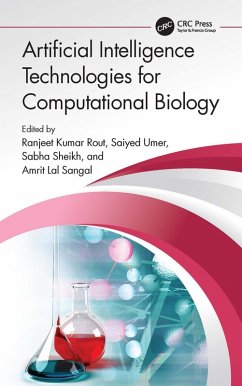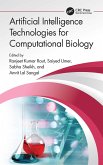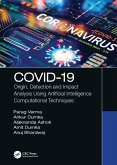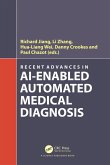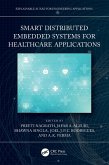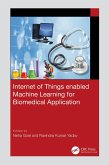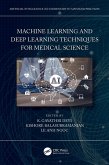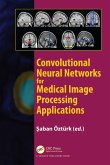Artificial Intelligence Technologies for Computational Biology (eBook, PDF)
Redaktion: Rout, Ranjeet Kumar; Sangal, Amrit Lal; Sheikh, Sabha; Umer, Saiyed
49,95 €
49,95 €
inkl. MwSt.
Sofort per Download lieferbar

25 °P sammeln
49,95 €
Als Download kaufen

49,95 €
inkl. MwSt.
Sofort per Download lieferbar

25 °P sammeln
Jetzt verschenken
Alle Infos zum eBook verschenken
49,95 €
inkl. MwSt.
Sofort per Download lieferbar
Alle Infos zum eBook verschenken

25 °P sammeln
Artificial Intelligence Technologies for Computational Biology (eBook, PDF)
Redaktion: Rout, Ranjeet Kumar; Sangal, Amrit Lal; Sheikh, Sabha; Umer, Saiyed
- Format: PDF
- Merkliste
- Auf die Merkliste
- Bewerten Bewerten
- Teilen
- Produkt teilen
- Produkterinnerung
- Produkterinnerung

Bitte loggen Sie sich zunächst in Ihr Kundenkonto ein oder registrieren Sie sich bei
bücher.de, um das eBook-Abo tolino select nutzen zu können.
Hier können Sie sich einloggen
Hier können Sie sich einloggen
Sie sind bereits eingeloggt. Klicken Sie auf 2. tolino select Abo, um fortzufahren.

Bitte loggen Sie sich zunächst in Ihr Kundenkonto ein oder registrieren Sie sich bei bücher.de, um das eBook-Abo tolino select nutzen zu können.
This text emphasizes the importance of artificial intelligence techniques in the field of biological computation. It also discusses fundamental principles that can be applied beyond bio-inspired computing.
- Geräte: PC
- mit Kopierschutz
- eBook Hilfe
Andere Kunden interessierten sich auch für
![Artificial Intelligence Technologies for Computational Biology (eBook, ePUB) Artificial Intelligence Technologies for Computational Biology (eBook, ePUB)]() Artificial Intelligence Technologies for Computational Biology (eBook, ePUB)49,95 €
Artificial Intelligence Technologies for Computational Biology (eBook, ePUB)49,95 €![COVID-19 (eBook, PDF) COVID-19 (eBook, PDF)]() Parag VermaCOVID-19 (eBook, PDF)47,95 €
Parag VermaCOVID-19 (eBook, PDF)47,95 €![Recent Advances in AI-enabled Automated Medical Diagnosis (eBook, PDF) Recent Advances in AI-enabled Automated Medical Diagnosis (eBook, PDF)]() Recent Advances in AI-enabled Automated Medical Diagnosis (eBook, PDF)54,95 €
Recent Advances in AI-enabled Automated Medical Diagnosis (eBook, PDF)54,95 €![Smart Distributed Embedded Systems for Healthcare Applications (eBook, PDF) Smart Distributed Embedded Systems for Healthcare Applications (eBook, PDF)]() Smart Distributed Embedded Systems for Healthcare Applications (eBook, PDF)51,95 €
Smart Distributed Embedded Systems for Healthcare Applications (eBook, PDF)51,95 €![Internet of Things enabled Machine Learning for Biomedical Applications (eBook, PDF) Internet of Things enabled Machine Learning for Biomedical Applications (eBook, PDF)]() Internet of Things enabled Machine Learning for Biomedical Applications (eBook, PDF)52,95 €
Internet of Things enabled Machine Learning for Biomedical Applications (eBook, PDF)52,95 €![Machine Learning and Deep Learning Techniques for Medical Science (eBook, PDF) Machine Learning and Deep Learning Techniques for Medical Science (eBook, PDF)]() Machine Learning and Deep Learning Techniques for Medical Science (eBook, PDF)48,95 €
Machine Learning and Deep Learning Techniques for Medical Science (eBook, PDF)48,95 €![Convolutional Neural Networks for Medical Image Processing Applications (eBook, PDF) Convolutional Neural Networks for Medical Image Processing Applications (eBook, PDF)]() Convolutional Neural Networks for Medical Image Processing Applications (eBook, PDF)55,95 €
Convolutional Neural Networks for Medical Image Processing Applications (eBook, PDF)55,95 €-
-
-
This text emphasizes the importance of artificial intelligence techniques in the field of biological computation. It also discusses fundamental principles that can be applied beyond bio-inspired computing.
Dieser Download kann aus rechtlichen Gründen nur mit Rechnungsadresse in A, B, BG, CY, CZ, D, DK, EW, E, FIN, F, GR, HR, H, IRL, I, LT, L, LR, M, NL, PL, P, R, S, SLO, SK ausgeliefert werden.
Produktdetails
- Produktdetails
- Verlag: Taylor & Francis eBooks
- Seitenzahl: 344
- Erscheinungstermin: 10. November 2022
- Englisch
- ISBN-13: 9781000778687
- Artikelnr.: 65483688
- Verlag: Taylor & Francis eBooks
- Seitenzahl: 344
- Erscheinungstermin: 10. November 2022
- Englisch
- ISBN-13: 9781000778687
- Artikelnr.: 65483688
- Herstellerkennzeichnung Die Herstellerinformationen sind derzeit nicht verfügbar.
Ranjeet Kumar Rout is currently serving as an assistant professor, department of computer science and engineering, National Institute of Technology Srinagar, India. Prior to working at NIT Srinagar, Dr. Ranjeet had research and teaching experience from Amity University Noida, National Institute Technology Jalandhar, and Indian Statistical Institute (ISI) Kolkata, India. His research interests include machine learning, and deep learning, visual cryptography, and computational biology. He has published papers in peer-reviewed international and scientific journals in the field of non-linear Boolean functions and computational biology. Saiyed Umer is presently working as an assistant professor in, department of computer science and engineering, Aliah University, Kolkata, India. He was the Research Personnel at Indian Statistical Institute (ISI), Kolkata, India, from November 2012 to April 2017. His research interests include biometric, computer vision, machine learning, video analysis, and deep learning. He has published research papers in journals of national and international repute. Sabha Sheikh is currently working as an assistant professor in, department of computer science and engineering, National Institute of Technology Srinagar, India. She has published papers in conferences and journals. Her research interests include machine learning, deep learning, image processing, and computational biology. A. L. Sangal is presently working as a professor (HAG) & Head, department of computer science and engineering, Dr. B R Ambedkar National Institute of Technology Jalandhar, Punjab, India. He has published more than 36 papers in national and international journals of repute, several papers in international conferences and two book chapters. His research interests include scientific computing, Computing Networks, information security, and cloud computing.
1. Graph Representation Learning for Protein Classification 2. Prediction
of Methylation Sites in Protein Sequences 3. A Taxonomy of e-Healthcare
Techniques and Solutions 4. Classification of Lung Diseases Using Machine
Learning Techniques 5. Multi-Objective Bacterial Foraging Optimization 6.
Artificial Intelligence for Biomedical Informatics 7. A Novel Approach for
Feature Selection Using Artificial Neural Networks and Particle Swarm
Optimization. 8. DL-based Diabetic Retinopathy Stage Classification from
Retinal Fundus Images 9. Cancer Diagnosis from Histopathology Images Using
Deep Learning: A Review 10. Skin Lesion Classification by Using Deep
Tree-CNN Prakash Choudhary and Sameer Mansuri 11. Diagnose Covid-19 On Its
Early Stages Using Lung CT Images 12. Impact of Machine Learning Practices
on Biomedical Informatics 13. Recognition of Types of Arrhythmia 14. ML and
DL Algorithms on Multi-Modal Omics Data.
of Methylation Sites in Protein Sequences 3. A Taxonomy of e-Healthcare
Techniques and Solutions 4. Classification of Lung Diseases Using Machine
Learning Techniques 5. Multi-Objective Bacterial Foraging Optimization 6.
Artificial Intelligence for Biomedical Informatics 7. A Novel Approach for
Feature Selection Using Artificial Neural Networks and Particle Swarm
Optimization. 8. DL-based Diabetic Retinopathy Stage Classification from
Retinal Fundus Images 9. Cancer Diagnosis from Histopathology Images Using
Deep Learning: A Review 10. Skin Lesion Classification by Using Deep
Tree-CNN Prakash Choudhary and Sameer Mansuri 11. Diagnose Covid-19 On Its
Early Stages Using Lung CT Images 12. Impact of Machine Learning Practices
on Biomedical Informatics 13. Recognition of Types of Arrhythmia 14. ML and
DL Algorithms on Multi-Modal Omics Data.
1. Graph Representation Learning for Protein Classification 2. Prediction
of Methylation Sites in Protein Sequences 3. A Taxonomy of e-Healthcare
Techniques and Solutions 4. Classification of Lung Diseases Using Machine
Learning Techniques 5. Multi-Objective Bacterial Foraging Optimization 6.
Artificial Intelligence for Biomedical Informatics 7. A Novel Approach for
Feature Selection Using Artificial Neural Networks and Particle Swarm
Optimization. 8. DL-based Diabetic Retinopathy Stage Classification from
Retinal Fundus Images 9. Cancer Diagnosis from Histopathology Images Using
Deep Learning: A Review 10. Skin Lesion Classification by Using Deep
Tree-CNN Prakash Choudhary and Sameer Mansuri 11. Diagnose Covid-19 On Its
Early Stages Using Lung CT Images 12. Impact of Machine Learning Practices
on Biomedical Informatics 13. Recognition of Types of Arrhythmia 14. ML and
DL Algorithms on Multi-Modal Omics Data.
of Methylation Sites in Protein Sequences 3. A Taxonomy of e-Healthcare
Techniques and Solutions 4. Classification of Lung Diseases Using Machine
Learning Techniques 5. Multi-Objective Bacterial Foraging Optimization 6.
Artificial Intelligence for Biomedical Informatics 7. A Novel Approach for
Feature Selection Using Artificial Neural Networks and Particle Swarm
Optimization. 8. DL-based Diabetic Retinopathy Stage Classification from
Retinal Fundus Images 9. Cancer Diagnosis from Histopathology Images Using
Deep Learning: A Review 10. Skin Lesion Classification by Using Deep
Tree-CNN Prakash Choudhary and Sameer Mansuri 11. Diagnose Covid-19 On Its
Early Stages Using Lung CT Images 12. Impact of Machine Learning Practices
on Biomedical Informatics 13. Recognition of Types of Arrhythmia 14. ML and
DL Algorithms on Multi-Modal Omics Data.
